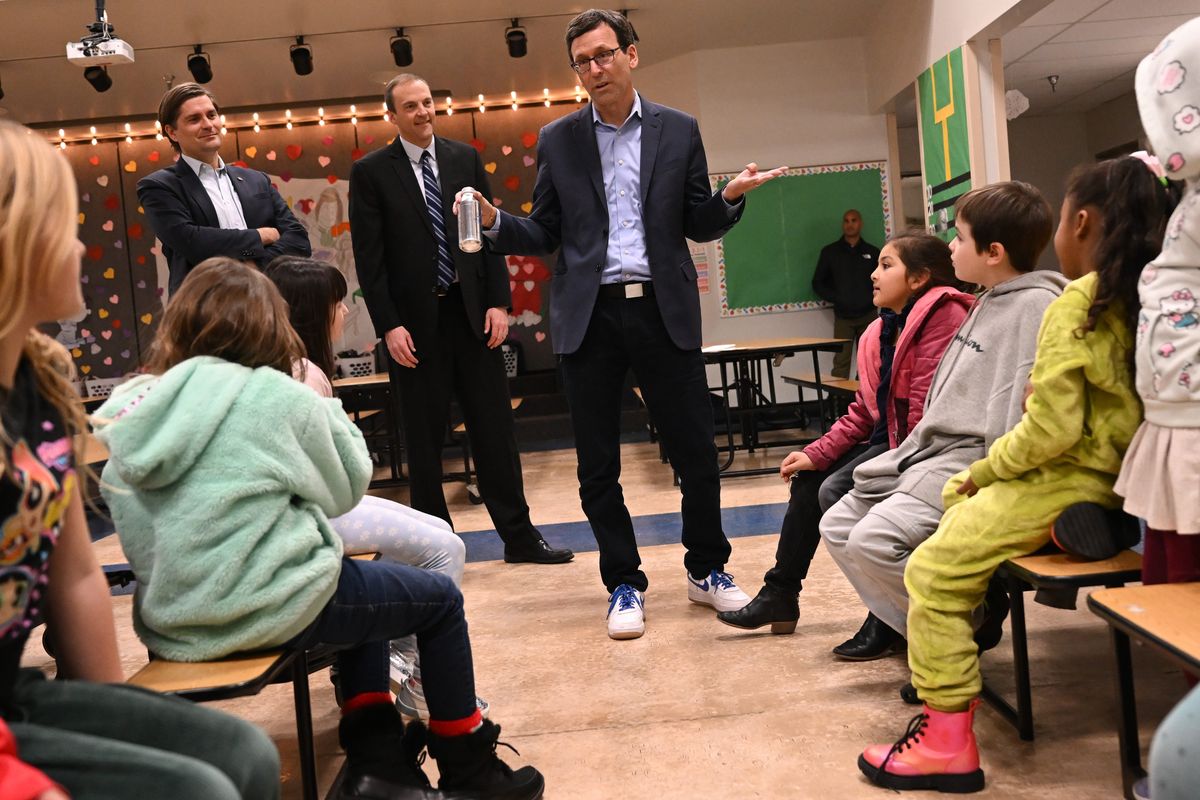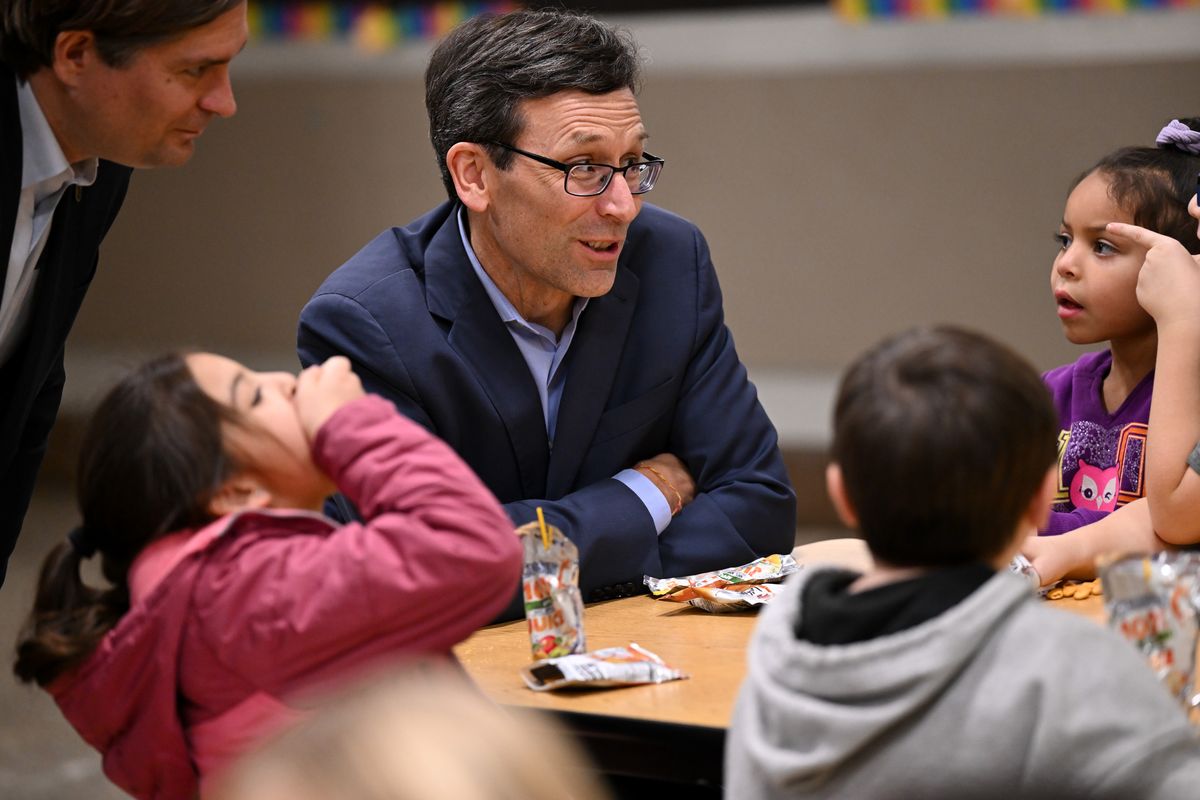Washington Legislature to again consider free school lunches for all students, could this be the year?
Washington State Treasurer Mike Pellicciotti, left, state Senator-elect Marcus Riccelli and Washington Governor-elect Bob Ferguson visits with Whitman Elementary School students on Friday at Whitman Elementary in Spokane. Ferguson was visiting to talk about free lunch programs for Washington students. (Tyler Tjomsland/The Spokesman-Review)
A recurring effort since the COVID-19 pandemic, free hot lunches could soon become a reality for every public school student in Washington.
Governor-elect Bob Ferguson intends to trim $4.4 billion from the state budget, but listed universal free lunches for Washington schoolchildren in his budget priorities announced Thursday. He spent part of his day Friday visiting Whitman Elementary in Spokane emphasizing his commitment to free lunches.
The push for universal free lunches in Washington started after the federal government instituted the practice during the COVID-19 pandemic. Incoming Spokane Sen. Marcus Riccelli, then a state representative, took up the cause of continuing free lunches regardless of ability to pay after the federal funding ended. The Democrat successfully rallied bipartisan support to pass three bills gradually expanding funding for universal free lunches in the state. Currently 70% of Washington students have access to the universal free lunch program, which also includes breakfast.
“We need to finish that important job,” Ferguson said Friday. “It will require an investment, but that investment will have impacts.”
A single parent earning $19 an hour makes too much to qualify for free lunches under federal guidelines, but doesn’t make enough to make ends meet, Ferguson said.
“That is not OK ,” he said. “That’s not acceptable.”
Ferguson acknowledged that adding funding to the free meal program may be difficult in a time of an estimated shortfall of $12 billion in the state budget over the next four years, but said the government has to prioritize just like families do when they budget.
“There is no greater priority for us as a state than our student’s education and keeping our students fed,” he said.
Washington has the fourth-highest average grocery bill in the contiguous United States, Ferguson said, making the meal program even more important.
“Hungry kids can’t learn,” he said. “We can’t talk about test scores until every kid is fed.”
His budget principles don’t detail a specific amount earmarked toward this priority, but the state Office of the Superintendent of Public Instruction in October reported more kids in more schools eating free meals than the state expected, with a cost of $108 million per year.
Riccelli appeared with Ferguson on Friday in Spokane, helping him hand out snacks to students in an after-school program and joking with them.
“We saw during the pandemic what happens when every child has access to free meals,” he said.
Spokane Public Schools began offering universal free lunch in the 2022-2023 school year. Whitman Elementary Principal Jody Schmidt said she’s seen how the program has impacted her school, which has a free and reduced lunch rate of 86%.
“Our disciplinary issues are down,” she said. “Our academics are up. It does make a huge difference for our students.”
It also means parents don’t have to worry about feeding their child during the school day, she said.
“It definitely does support our families,” she said. “No one is turned away.”
Spokane Public Schools Superintendent Adam Swinyard said the program is particularly important for families who make too much to qualify for assistance programs but are barely getting by. Data suggests that nearly a quarter of families in the Spokane district fall into that category, Swinyard said.
“This program has significant impact on families who are underemployed,” he said. “Historically, we’ve been at 50% free and reduced lunch.”
Still, over 300,000 students in Washington state pay for school lunches.
“70% is a C-, and our kids deserve an A+,” Riccelli said in an interview Friday.
Schools qualify for state subsidized meals if 40% of their student body is classified as low income, identified through applications for free or reduced-priced lunches or enrollment in other government assistance programs like food stamps or some Medicaid plans.
In past years’ legislative debates, opposing lawmakers shared concerns the expansion may unintentionally disqualify some schools from poverty-based federal funding.
Schools compile financial information from families in the process of applying for free meals – information that qualifies schools for federal and state benefits based on proportions of low-income students. In removing the process to apply for free meals, lawmakers were concerned fewer parents would complete the form and schools would miss out on benefits because of fewer reported poor families.
Swinyard said most families are still filling out the form required for federal funding.
“That information is really important because some of our federal funding is based on poverty levels,” he said. “For the most part, we’re getting the information we need.”
Riccelli said anecdotally he’s heard of a “slight dip” in applications in some schools last school year, with improved completion this school year through schools urging parents to apply.
In an interview Friday, Rep. Leonard Christain, R-Spokane Valley, said potential future legislation should have exceptions for some schools. He pointed to Orchard Prairie, a 78-student school district within his legislative district that may struggle with a state mandate. With no industrial kitchen on their two-school campus, the school doesn’t have the capacity to serve hot lunch.
Orchard Prairie doesn’t have enough low-income students for state-sponsored free lunches under the 2023 bill, which does allow for exceptions should a school make a case for noncompliance.
Interest in free school lunches is growing among state lawmakers around the nation as eight states guarantee free meals in their schools. California, Colorado, Maine, Massachusetts, Michigan, Minnesota, New Mexico and Vermont passed laws in the past three years. Minnesota’s law garnered significant national attention in the lead-up to the presidential election as Democratic vice-presidential hopeful Tim Walz, the Minnesota governor, repeatedly touted his state’s policies as a win against child hunger in the Harris-Walz campaign.
Funneling free food for every student in the state has been a “passion project” for Riccelli since the pandemic, and he’s confident with Ferguson’s support, this is his year. He plans to introduce a governor-endorsed universal free school meal bill early in the session that starts Monday.
“It’s the right thing to do,” Ferguson said. “I’m going to work very hard to make this happen.”

